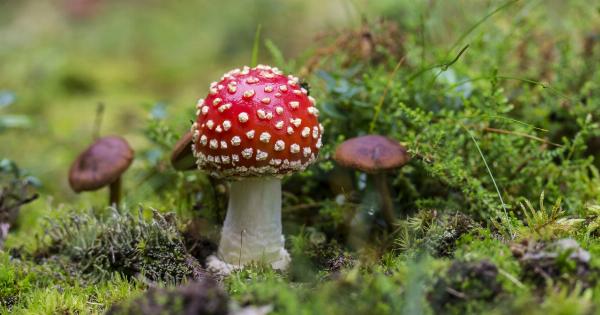Tea is one of the most popular and widely consumed beverages in the world. It is known for its numerous health benefits and soothing effects.
However, what many tea lovers may not be aware of is that their favorite cup of tea could be harboring harmful chemicals. From pesticides to heavy metals, the tea industry has its fair share of shocking facts that consumers should be aware of. In this article, we will explore some of these lesser-known truths about the chemicals in your tea.
Pesticide Residues: A Lingering Threat
One of the most alarming concerns when it comes to tea production is the excessive use of pesticides. Tea leaves are often sprayed with pesticides to prevent pests and diseases, leading to high levels of pesticide residues in the final product.
These residues can pose significant health risks when consumed regularly.
Studies have shown that certain pesticides used in tea cultivation, such as endosulfan and DDT, are highly toxic and can lead to serious health issues.
Prolonged exposure to these chemicals has been linked to various diseases, including cancer, hormonal imbalances, and reproductive disorders.
Heavy Metals: Sneaky Contaminants
In addition to pesticides, tea leaves can also accumulate heavy metals from contaminated soil and water sources. Heavy metals such as lead, arsenic, and cadmium can find their way into tea leaves during the growing process.
These metals are known to be toxic and can cause severe health problems when ingested.
Lead, for example, can affect the nervous system and lead to developmental delays in children. Arsenic is a carcinogen and long-term exposure can increase the risk of cancer. Cadmium can accumulate in the kidneys and lead to kidney damage over time.
Artificial Flavors and Additives
Many tea manufacturers use artificial flavors and additives to enhance the taste and aroma of their products.
These additives can range from harmless substances like natural vanilla extracts to potentially harmful chemicals like artificial sweeteners and flavor enhancers.
Artificial sweeteners, such as aspartame, have been linked to various health problems, including metabolic disorders and increased sugar cravings.
Flavor enhancers like monosodium glutamate (MSG) can cause allergic reactions and potentially harm the nervous system.
Dyes and Bleaching Agents
To achieve an appealing look, some tea producers resort to using dyes and bleaching agents. These chemicals can alter the color of the tea leaves and make them appear more vibrant.
However, the use of artificial dyes and bleaching agents can have detrimental effects on human health.
Some dyes, such as sunset yellow and tartrazine, have been associated with allergic reactions, hyperactivity, and even cancer. Bleaching agents like sodium perborate can damage the gastrointestinal system and cause digestive issues.
Genetically Modified Organisms (GMOs)
The tea industry, like many other agricultural sectors, has seen the introduction of genetically modified organisms (GMOs). Genetically modified tea plants are designed to resist diseases or improve yield.
However, the long-term effects of consuming GMOs are still not fully understood.
Many consumers prefer to avoid GMOs due to environmental and health concerns.
Unfortunately, it can be challenging to ascertain whether the tea you’re drinking is made from genetically modified plants or not, as labeling laws vary across countries.
Contaminated Water Sources
The quality of the water used in tea production is another crucial factor to consider. Tea plants absorb both nutrients and pollutants from the soil and water they are grown in.
Therefore, if the water sources are contaminated with chemicals or heavy metals, the tea leaves are likely to contain these harmful substances as well.
Water pollution can stem from various sources, including industrial waste, agricultural runoff, and improper waste disposal.
Ensuring the use of clean water in tea cultivation is vital to minimize the risk of chemical contamination in the final product.
Organic Tea: A Safer Alternative?
With all these shocking facts about the chemicals found in tea, many consumers turn to organic tea as a safer alternative. Organic tea is produced without the use of synthetic pesticides, fertilizers, or genetically modified organisms.
It is grown in healthier soil and tends to retain fewer harmful chemicals.
Choosing organic tea can significantly reduce the exposure to harmful chemicals and alleviate the associated health risks.
However, it is important to note that even organic tea may still contain traces of pesticides or heavy metals due to cross-contamination from neighboring non-organic farms.
Buying and Brew Tips
When it comes to choosing and brewing tea, there are a few tips to keep in mind to minimize the potential risks associated with chemicals. Consider the following:.
- Opt for loose leaf tea: Loose tea leaves generally contain fewer chemicals compared to tea bags, as the latter often contain broken leaves and “dust,” which have a higher chance of contamination.
- Research tea brands: Look for reputable tea brands that prioritize quality and transparency in their production processes. Brands that are certified organic or adhere to strict pesticide regulations are often a safer choice.
- Use filtered water: Using filtered or purified water can help reduce the presence of pollutants and contaminants in your brewed tea.
- Be mindful of brewing time and temperature: Overbrewing or using overly hot water can release more chemicals from the tea leaves. Follow the recommended brewing guidelines for each type of tea.
The Bottom Line
While tea is generally considered a healthy beverage, it is crucial to be aware of the potential presence of harmful chemicals. Pesticide residues, heavy metals, artificial additives, and other contaminants can find their way into your cup of tea.
Opting for organic tea, knowing the source, and brewing mindfully can help reduce the risks associated with these chemicals. Stay informed and make conscious choices to enjoy your tea without compromising your well-being.






























